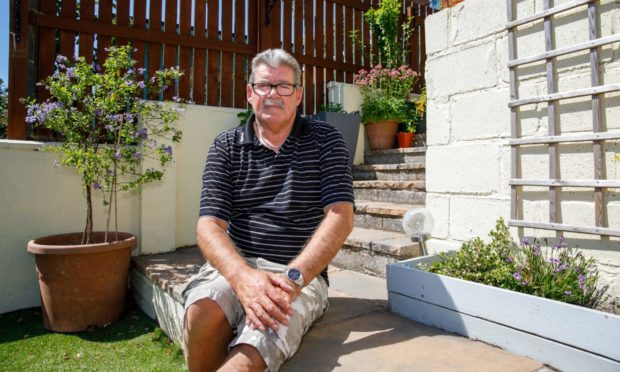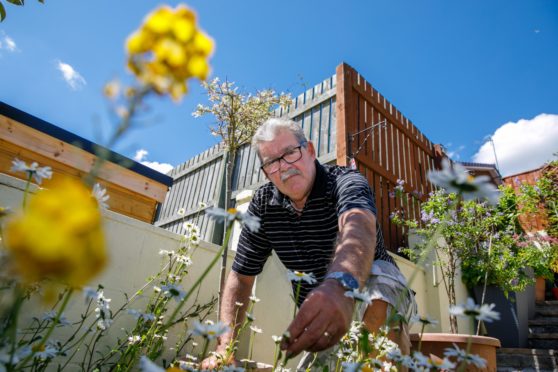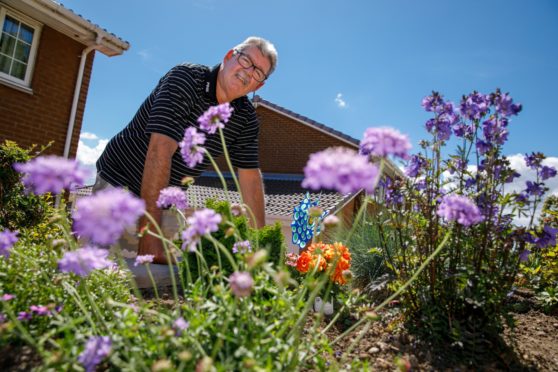Every year in Scotland 5,500 new cases of lung cancer are diagnosed, but early detection can be the key to survival. One Fife man shares his story, urging others to get checked at the first sign of symptoms.
Fifer Kevin Main visited his GP in 2017 with mild symptoms and breathlessness.
Kevin remembers: “The doctor thought I had a touch of bronchitis. He gave me an inhaler, antibiotics and told me to come back within a week if I wasn’t any better.
“Unfortunately my mum passed away not long after the appointment, so I had all that to arrange. I just thought I would get better.
“But I wasn’t getting better. I was finding things I did at work, which I usually did no bother, I was struggling with. I felt there was definitely something wrong. ”
Kevin returned to see his GP in February, who told him to book himself in for an x-ray at Victoria Hospital in Kirkcaldy immediately.
“Less than a week after the x-ray, my GP called and asked if I could go in and see him right away. I thought it didn’t sound good.
“He sat me down and said ‘the results of the x-ray are showing you have lung cancer’.
“The big black cloud comes over you and you do start to get worried.”
A biopsy revealed Kevin had small cell lung cancer – a type of cancer that makes up just 13% of lung cancer cases and spreads faster than the non-small cell form.
‘I’m going to cure you’
Kevin was just 57 when he was diagnosed. After meeting with his oncologist and cancer nurse, his treatment plan was created.
Because he was still young and strong, it was decided Kevin would receive chemotherapy and radiotherapy at the same time.
Kevin explains: “They just wanted to blast it. I asked what they thought the outcome would be and my oncologist said ‘I’m going to cure you’.
“I was basically going in for 10 minutes of treatment every day and the staff were great, from the guys who operate the car parks to the staff in radiotherapy.
“They were brilliant, they couldn’t do enough for you.”
Thankfully, Kevin’s treatment was a success and he’s now cancer-free. He’s making the most of life, spending time in his garden and looking after his grandchildren.
Kevin says: “If anyone has any symptoms, they should go and get them seen to as soon as possible.
“I knew there was something seriously wrong with me because I’m quite a strong person and I was struggling to do physical things that I’d never struggled with before.
“Before, I used to run up a flight of stairs, but I was getting halfway up and having to stop. I just couldn’t go any further. I’d rest for five or 10 minutes and then move on.
“If they say ‘jump’, you ask ‘how high?’. The treatment has cured me.
“My wife keeps saying I’m a walking miracle and she doesn’t know how I’ve managed to do this. But you’ve just got to. What if you don’t do anything?”
Detecting cancer early
Lung cancer is the most common type of cancer to be diagnosed in Scotland, with 5,500 new cases developing every year.
Cases of lung cancer are three times higher in the most deprived areas of Scotland, compared with the least deprived areas.
And 25% fewer lung cancer cases are being diagnosed now compared to pre-Covid-19.
The fear of a potential cancer diagnosis often prevents people from taking action when symptoms are first noticed, even at a time when there are more treatment options available and the chance of survival is higher than ever.
The Detect Cancer Early campaign, spearheaded by the Scottish Government and backed by NHS Fife, urges people not to ‘let lung cancer make itself at home’ and to get the early symptoms checked as soon as they’re noticed.
Those older than 40 who have a new or different persistent cough, or unusual breathlessness, for three weeks or more are urged to contact their GP.
Symptoms of lung cancer
Signs and symptoms of lung cancer that people older that 40 should get checked include:
- A persistent new or different cough for three weeks or more, after testing negative for Covid-19
- Feeling breathless or more breathless than usual for no reason
- Persistent or recurring chest infection
- Coughing up blood
- Unexplained weight loss
- Loss of appetite
- Chest or shoulder pain
- Fatigue in smoker or ex-smoker
- A (new) hoarse voice












